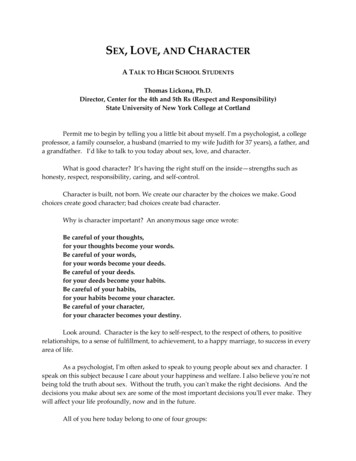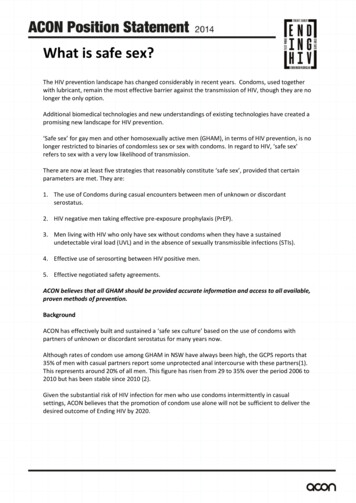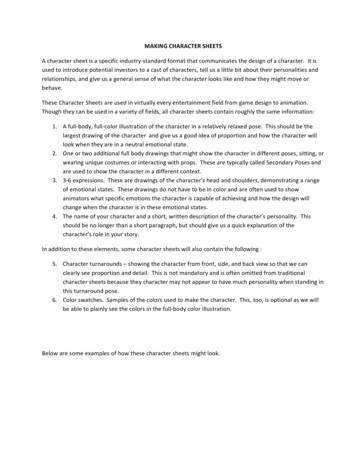
Transcription
SEX, LOVE, AND CHARACTERA TALK TO HIGH SCHOOL STUDENTSThomas Lickona, Ph.D.Director, Center for the 4th and 5th Rs (Respect and Responsibility)State University of New York College at CortlandPermit me to begin by telling you a little bit about myself. I'm a psychologist, a collegeprofessor, a family counselor, a husband (married to my wife Judith for 37 years), a father, anda grandfather. I’d like to talk to you today about sex, love, and character.What is good character? It’s having the right stuff on the inside—strengths such ashonesty, respect, responsibility, caring, and self-control.Character is built, not born. We create our character by the choices we make. Goodchoices create good character; bad choices create bad character.Why is character important? An anonymous sage once wrote:Be careful of your thoughts,for your thoughts become your words.Be careful of your words,for your words become your deeds.Be careful of your deeds.for your deeds become your habits.Be careful of your habits,for your habits become your character.Be careful of your character,for your character becomes your destiny.Look around. Character is the key to self-respect, to the respect of others, to positiverelationships, to a sense of fulfillment, to achievement, to a happy marriage, to success in everyarea of life.As a psychologist, I'm often asked to speak to young people about sex and character. Ispeak on this subject because I care about your happiness and welfare. I also believe you're notbeing told the truth about sex. Without the truth, you can't make the right decisions. And thedecisions you make about sex are some of the most important decisions you'll ever make. Theywill affect your life profoundly, now and in the future.All of you here today belong to one of four groups:
21. You have never been sexually intimate with another person, and you do not intend to do sountil you get married.2. You have never been sexually intimate, but you're not sure what you think about sexualintimacy before marriage.3. You have been sexually intimate, and you don't see anything wrong with it.4. You have been sexually intimate, but you now consider it a mistake—or you're not surewhat you want to do in the future.Whichever of these four groups you belong to, I'd like to offer you a way of thinkingabout sex—a way I believe will help you make wise sexual decisions, decisions that will helpyou build a good character and lead a good and happy life. You may not agree with everythingI have to say, but I ask you to listen thoughtfully.Don't Think, "It's Too Late For Me"I'd like to say a special word at the start to anyone who may be in these last twogroups—persons who may have already had a sexual relationship. You may think, "It's too latefor me to change, even if I wanted to.” But in fact, you have the power to make different choices atany point in your life. You can put the past behind you; you can make a fresh start. A greatmany young people have done exactly that. If you have religious faith, you can ask God'sforgiveness for past mistakes and for help in following a different path in the future.Let me give you an example of someone who is making a fresh start. She is 22-years old,a former student of mine, and a first-year elementary school teacher. She is now working onher Master's degree in Education, and last spring she took my graduate course on charactereducation. For her course project, she did a paper titled, "Teaching My Younger Sister AboutSex and Love." In her paper she wrote:I wanted to inform my 14-year-old sister Kathy about something that I unfortunately just beganto take seriously: abstinence. Sure, I have always known what the word meant, but I had neverconsidered it an option for me, until recently. I felt it was my responsibility to pass thephilosophy of abstinence on to my sister because I know she won't get it in the "going to do itanyway" program that is used at her high school. Also, she is a virgin (her friend is, too), so Iwanted to show her how important it is to hold onto that purity.She says she began their discussions when she accidentally overheard her sister Kathyand her friend Michelle talking about a person they referred to as a "slut." She says:I asked them why they considered her a "slut." Michelle responded, "She has slept with eightguys already, and she is easy." I asked them to think about why this girl is so promiscuous.Kathy said, "She's trying to keep a boyfriend."
3We first tackled the issue of sex as "showing love" or "keeping a boyfriend." I used the exampleof the girl they had been talking about to show how boyfriends come and go whether girls haveintercourse with them or not. We also talked about girls' feelings when they are rejected aftergiving part of themselves to another person.I then told them about my having had premarital sex, and how I wished these relationships hadnever occurred—and that the only true way to find out if a guy loves you is to make him waituntil marriage.We talked about the self-respect and courage involved in leading chaste lives until marriage.These two young girls developed a new awareness of how truly loving relationships andcommitments develop and are sustained. Their awareness was evident in their response to mydisclosing that I recently told my boyfriend that I wanted to abstain from sex from now on and hesaid he couldn't do that. I asked Kathy and Michelle if they thought the relationship was worthcontinuing. They both said, "No, he does not love you if he won't wait for you." I was proud oftheir answer.Besides being more confident in their virginity, Kathy and Michelle have now set the personalgoal of saving sex for marriage.So never think, “It's too late for me.” If you haven't saved sex for marriage, start savingit. Although you can't regain your physical virginity, you can regain chastity at any time. Chastity is amoral decision from this moment forward to save all sexual intimacy for your marriage partner.In sharing my thoughts about sex, I'd like to address 10 questions young people oftenhave about this subject.1.ISN'T SEX A NATURAL WAY TO EXPRESS YOUR LOVE?A few years ago I spoke in Canada at a conference for parents. In one of the breakoutgroups, a mother disclosed a situation she was facing with her 16-year-old daughter Karen. Forthe past year, Karen had been dating a boy David, who was nearly three years older. Karen hadrecently come to her mother and said, "David and I feel we're ready to have sex."The mother was stunned. She replied, "But, Karen, sex is meant for love." Karen said,"But, Mom, we do love each other, and this is how we want to express it." The mother said shewas then at a loss for words.What would we say if this were our own child, student, or friend? We could ask, "Whatdoes it really mean to love someone?"Love means wanting what is best for the other person, seeking the greatest good for thatperson. How do you know when somebody really loves you? When they want what is trulybest for your welfare, your happiness—not just now, but forever. Measured against thatstandard, is having sex with someone you aren't married to truly an act of love?
4The way to answer that question is to ask, what are the consequences that can comefrom sex between unmarried persons? Pregnancy is one. Sexually transmitted disease isanother. Emotional and spiritual hurt is a third. If you really love somebody, if you truly wantwhat is best for that person, will you gamble with his or her health, life, and happiness?Consider these lines from the pamphlet "Love Waits":Love is patient, love is kind. Love wants what is best for another person. Love neverdemands something that will harm you or the person you love.Love will never cross the line between what's right and wrong. It's wrong to put oneanother in danger of having to deal with hard choices. . . . choices that could changeyour lives, your goals, and your plans forever.Having sex before marriage may feel right for the moment. But the possible costs of anunexpected pregnancy, abortion, and sexually transmitted disease—as well as the deephurts that can come from a broken relationship—outweigh the feelings of the moment.The feelings are temporary; their consequences are long-lasting.All good things are worth waiting for. Waiting until marriage to have sex is a maturedecision to control your desires. If you are getting to know someone—or are in arelationship—remember: If it's love, love waits.2.BUT WHAT IF YOU USE CONTRACEPTION—DOESN'T THAT MAKE SEXRESPONSIBLE?There are two ways to answer this question. From the perspective of some religions—Catholicism, for example—contraception goes against God's plan for sex, because God designssex for two purposes: to be love-giving and life-giving. Sex is for deepening love between ahusband and wife and for the procreation of children. Contraception kills the life-giving powerof sex. By contrast, Natural Family Planning—abstaining from sexual relations for the few daysa month when a woman is fertile—uses the natural fertility cycle to postpone a pregnancy.The Myth of "Safe Sex"There's a second way to address the question of "protection." And that's to ask, doescontraception really make unmarried sex "safe," as is so commonly claimed in the media? Whatis the truth?The truth is that no matter what type of contraception you use, the girl can still getpregnant. It happens—and then there is a developing life to deal with. Among adult users,condoms have an average annual failure rate of 15% in preventing pregnancy, according tostudies published in Family Planning Perspectives. Among teens, who typically don't usecondoms with 100% consistency and correctness, the failure rate can go as high as 30%.
5Abortion: Not a "Quick Fix"Many teens who get pregnant turn to abortion to try to solve that problem. Our countryhas the highest teenage abortion rate in the developed world, according to a United Nationsstudy. About 300,000 abortions are performed on teens each year.Abortion poses a number of medical risks for the girl (risks that the abortionist typicallywill not tell you about):1.2.3.4.5.6.7.mild to severe infectionmild to severe bleedingpuncturing of the uterus or other internal organsinfertility as a result of scarring from the abortiona greater chance of breast cancer later in lifea greater chance of a subsequent miscarriagea greater chance of having a deformed child.These are all possible consequences of abortion for the woman. For the baby in thewomb, abortion means certain death. That death is horribly violent. Abortion is the mostcommon medical surgery in the country today, but you will never see a TV special showing youthe different kinds of abortions. It's kept in the dark. You can, however, read any medicalencyclopedia and find the different abortion procedures described there.There are six methods of abortion. Permit me to describe just one. The most commonmethod is suction abortion. A suction abortion is performed when the baby in the womb is 7 to12 weeks old. At only 3 weeks of age, even before a woman knows she is pregnant, the babyalready has eyes and a heart beat. At 6 weeks, the preborn baby has measurable brain waves.In a suction abortion, a hollow tube with a knife-like edge is inserted into the woman'swomb. A powerful vacuum machine is attached to the tube and sucks the baby out of themother's womb. The knife-like edge of the tube slices the baby's body into small pieces, whichare collected in a jar. Other methods of abortion, performed later in pregnancy when the baby ismore developed, are even more gruesome.The Emotional Aftermath of AbortionWhat are the emotional aftereffects of abortion? Nancy Jo Mann is the founder of agroup known as WEBA—Women Exploited By Abortion. She had an abortion when she was 5months pregnant. She says, "I'm sure there are women out there who are never fazed by theirabortion. But I would say that 98% of them are fazed, whether it's for a small period of time orfor the rest of their lives."She says that abortion's emotional aftereffects include grief, remorse, suicidal impulses,loss of self-esteem, anger, and rage. She says:
6There is a desire to remember the death date. A preoccupation with the date when thebaby would have been born. My daughter was due in early March.There is an interest in babies but a thwarted maternal instinct. We have many women inour group who cannot hold children. There is a hatred for anyone connected withabortion. There is a lack of desire to enter into a relationship, a loss of interest in sex,and an inability to forgive oneself. Nightmares, tremors, and feelings of having beenexploited. And child abuse. We see a lot of child abuse on the part of women who havehad an abortion.Here is the testimony of a young mother, now in her early 30s, regarding the abortionshe had when she was in college. She reflected on her experience in a column for the RochesterDemocrat and Chronicle newspaper:It was spring of 1985, my sophomore year in college. I came back from winter break sickas a dog. I had trouble keeping food down. The doctor in the campus infirmary took aurine test and told me in a non-judgmental way that I was pregnant. “What would youlike to do?” he asked.“I want to get rid of it,” I said, without even blinking an eye.He quietly wrote down the phone number and address of the local Planned Parenthoodand assured me he would be available if I needed him. The counselor at PlannedParenthood asked me if I was sure I wanted an abortion, and I said yes. That was it. Noinformation on pregnancy and birth, no list of possible choices, no discussion ofmotherhood.The day was set. My boyfriend couldn’t be bothered to make himself available. Itrained on the day of the “procedure.” It was surprisingly simple and relatively painless.Afterwards I felt immediately 100% better. The nausea ceased. There was strongcramping, but I could handle that.If someone had asked me right then how I felt about what I had just done, I would havesaid, “Wow, this is great! I have my health back, I have my life back!”Go ahead, ask me now.I am, at this moment, crying.How callous I was. Just a kid, really. Self-centered and shallow. There were, and arenow, so many other alternatives.I am humbled by my two amazing living children. Most of all, I am humbled by myfriend, Amy. She felt so strongly for her miscarried unborn child that she gave the childa name and a funeral. I didn’t give mine a second thought—until I grew up.
7Men, too, can suffer from the emotional aftershocks of abortion. Bottom line: Abortion isnot a quick fix. I hope, for your own sake, that if you ever face a crisis pregnancy, you won'tturn to abortion. If you're a guy who gets a girl pregnant, I hope you’ll be man enough not topressure her to have an abortion. There are many crisis pregnancy centers such as Birthright(800-550-4900) and The Nurturing Network (800-TNN-4MOM) that will give you free andcompassionate help—help to carry the baby to term and either keep the baby, if that’s yourdecision, or place it in the home of loving adoptive parents.If you have had an abortion, or been involved in an abortion in any way, you can seekhelp and healing from support groups such as Project Rachel (800-5WE-CARE). If you havefaith, you can ask God for forgiveness and for the grace to forgive yourself.Sexually Transmitted DiseasesWhat kind of "protection" do condoms offer against sexually transmitted diseases suchas AIDS? Dr. Susan Weller at the University of Texas Medical Branch at Galveston, in ananalysis of 11 different studies, found that condoms on the average failed 31% of the time toprevent transmission of AIDS virus (Social Science and Medicine, June 1993).In the November, 1997 edition of the Italian journal Medicine and Morals, the Frenchpriest-physician Jacques Suaudeau reported that "the risk of contracting an HIV infection whileusing a condom is at least 10 to 15%," based on his review of 88 studies, most of them fromAmerican sources.A 2001 National Institutes of Health report, summarizing hundreds of studies,concluded that condoms reduce sexual transmission of HIV/AIDS by 87%, but only ifused 100% of the time.So condoms reduce the risk of AIDS but by no means eliminate the risk.What about other STDs? The big three—the most common STDs—are human papillomavirus (HPV), herpes, and chlamydia. Medical studies show that condoms provide even lessprotection ("zero" to "some") against these three diseases.Human Papilloma Virus (HPV). This is the cause of virtually all cervical cancer. It caninfect anywhere in the male or female genital region and may be spread by skin-to-skincontact during sex. Condoms, which cover only a small part of the genital area,therefore do not prevent its transmission.Herpes. This causes genital sores and cannot be cured. Once you get herpes, you've gotit for life. Like HPV, herpes can be transmitted by skin-to-skin contact in the entiregenital area and is not prevented by the use of a condom.
8Chlamydia. Undetected, chlamydia can lead to pelvic inflammatory disease andscarring of the fallopian tubes. It may be transmitted by secretions during sex thatmoisten the genitals outside the area covered by the condom.A special word about chlamydia. One of five newly married American couples cannotconceive a baby. There are multiple causes of infertility, but chlamydia is the fastest growingcause. Medical studies show that condoms provide little protection against the sexualtransmission of the chlamydia bacteria. So if you are having premarital sex, you may begambling away your ability to have a baby when you get married. Is that something you wantto gamble with?Infertility is a tremendous stress on a marriage. If it was caused by STD, the stress iseven greater. A 33-year-old wife recently wrote a letter to Dear Abby:Abby, sometime during my wild college days, I picked up an infection that damaged the inside ofmy fallopian tubes and left me infertile. I am now married to a wonderful man who very muchwants children, and the guilt I feel is overwhelming. We will look into adoption, but this wholeordeal has been terribly difficult.3.WHAT ARE THE MENTAL, EMOTIONAL, AND SPIRITUAL DANGERS OFPREMARITAL SEX?Pregnancy, abortion, sexually transmitted disease, and the inability to have a baby areall physical dangers of premarital sex which have serious emotional consequences as well. Butwhat if you don't get pregnant, don't have an abortion, don't catch any STDs, and don't loseyour fertility? Even if you escape these physical dangers, are there still mental, emotional, andspiritual dangers of temporary sexual relationships?There are. The psychological and spiritual repercussions of premarital sex are many andvaried. They include:1.2.3.4.5.6.7.regret and recriminationguiltfeelings of being usedself-contempt for being a userfear of commitment because of having been burnedrage over betrayal, sometimes leading to violencedepression, sometimes leading to suicide (sexually active 12- to 16-year old girls are sixtimes more likely to attempt suicide than girls who are virgins)8. ruined relationships (because sex often comes to dominate a relationship)9. stunted personal growth (because premature sex can hinder your identity development10. the separation from God that serious sin, until repented, always causes.You don’t see these consequences of sex outside marriage depicted on TV or in themovies. You don’t read about them in Seventeen or Sassy. But they are very real.
9Here is a teenage girl speaking of her experience:I am 16 and have already lost my virginity. I truly regret that my first time was with a guy thatI didn't care that much about.Since that first night, he expects sex on every date. When I don't feel like it, we end up in anargument. I don't think this guy is in love with me, and I know deep down that I am not in lovewith him either. This makes me feel cheap.I realize now that this is a very big step in a girl's life. After you've done it, things are never thesame. It changes everything. My advice is, don't be in such a rush. It's a headache and a worry.Sex is not for entertainment. It should be a commitment. Be smart and save yourself for someoneyou wouldn't mind spending the rest of your life with.—Sorry I Didn't and Wish I Could Take It BackA college guy talks about his guilt:I finally got a girl into bed when I was 17. Then she started saying she loved me and gettingclingy. After four weeks of having sex as often as I wanted, I was tired of her and dumped her.That made me feel pretty low, because I could see that she was hurting.In short, there is no condom for your heart, mind, character, or soul. Condoms don’tmake sex physically safe (you can still get sick or pregnant), emotionally safe (you can still gethurt), or ethically loving (can you claim to love someone if you’re gambling with their healthand happiness?).It’s also important to think about the intrinsic meaning of sex. What makes sex special?Why is sex not a recreational sport? Why is it not like bowling or tennis?Dietrich von Hildebrand, one of the great philosophers of the 20th century, writes aboutwhat makes sex different. Among the many activities of the human body, he says, sex occupiesa unique position. Other bodily experiences, such as a good dinner or a good night’s sleep,belong to the superficial zone of human experience. Sex, however, is essentially deep. Ourentire person, body and soul, is involved. That is why sex has unique psychological andspiritual effects. The abuse of sex defiles a person in a way that gluttony, for example, cannever do.In sex, we give our whole self, intimately and personally. “The sexual act,“ vonHildebrand says, “is the most vital and intense experience of which the body is capable.” Webecome what we do with our bodies, and there is no deeper act than sex.
10Put another way, sex is a unique self-gift. If I engage in this deepest of possible intimacieswith no intention of a lasting union with my partner, I have taken something profound andprecious and thrown it away. In a very real sense, I have squandered my self.4.CAN PREMARITAL SEX HURT YOUR MARRIAGE?If I were to ask, "How many of you would like to be happily married someday?", most ofyou would probably raise your hands. If I were to ask, "How many would like to have afulfilling sexual relationship within your marriage?", the same number of hands would go up.So it makes sense to ask: What kind of sexual decisions at this time of your life willmaximize your chances of a happy and sexually fulfilling marriage later on? Premarital sex candetract from, and even seriously damage, your sexual happiness in marriage. It can do so inseveral ways.One is comparisons. If you have had sex with someone besides your husband or wife,there will be the tendency, sometimes beyond your control, to compare your spouse withprevious sexual partners. One husband says, "When I make love with my wife, I think, 'Thisgirl could kiss better," or 'This girl could do that better.' I can't get rid of the comparisons."Sometimes this problem takes the form of flashbacks—involuntary mental images ofone's previous sexual experiences with other partners. Both women and men report thesedistressing intrusions into their marriage relationship. One young husband comments:I've been married to one of the most wonderful women in the world for eight years, but I havenever been "alone" in the bedroom with her. I would do anything to forget the sexual experiencesI had before I met my wife. When we start having intercourse, the pictures of the past and otherwomen go through my head, and it's killing any intimacy. I've gotten to the point where I nolonger want to have sex.Premarital sex can also lead to boredom with sex after marriage. In his book Becoming aFriend and Lover, psychologist Dick Purnell says the more you fool around with sex beforemarriage, the less exciting it is after the wedding."Before marriage," Purnell explains, "your body reacts excitedly to the forbidden aspect ofsex. When you marry and take the forbidden fruits' idea out of sex and heavy petting, you takeout much of the excitement. You've conditioned your body to respond to the wrong kind ofexcitement in sex."There may also be a lack of trust that comes from knowing that your husband or wifehad previous sexual partners, or that you and your spouse were sexually intimate with eachother before marriage. Says one wife: "When I think of how Mike and I were sexually involvedwhen I was his secretary, it makes me wonder what he would do now if he met somebody hewas very much attracted to." Studies reported over the past decade in the Journal of Marriage and
11the Family find that persons who are sexually active before marriage are in fact more likely to beunfaithful to their spouse after marriage.So think of the kind of marriage you want, and the kind of sexual relationship you'dmost like to have with your husband or wife. What will make that relationship most free,secure, and fulfilling? Molly Kelly, a chastity educator who speaks to thousands of studentseach year, says to think of how you'd like your wedding night to be: "There is no greater giftthat a man and a woman can give each other on their wedding night than the gift of theirvirginity. And it's a gift you can give only once."5.WHAT IF YOU'RE ENGAGED?What if you're planning to get married—isn't sex okay then? Consider the story of Jack,an acquaintance of mine. Jack and his girlfriend Linda lived together when they were in theirmid-20's. They believed they had a "committed relationship."Even though they were using contraception, Linda became pregnant. Neither believedin abortion, so they had the baby, a little girl named Becky.A year later they broke up. Linda moved several states away. She found a newboyfriend, and told Jack she didn't want him visiting Becky. Jack says, "I grieve for mydaughter. She's three now, and I really long to see her. This is my child, and I can't have arelationship with her."Neither can Becky experience the love of her father. These are very big consequences,ones that Jack never imagined when he and Linda were living together. But that relationshipbrought forth a new human life—one for whom there was not, as there should have been, amarriage and a family in which she could be loved and raised.When you're married, truly married, sexual union is part of a bigger union. You joinyour bodies because you've joined your lives. In body language, sex says to the other person, “Igive myself to you completely.” Within the marriage commitment, that's really true. By contrast,sex before marriage is lying with your body. It's like saying, “I give myself to you completely, butnot really.” The ultimate intimacy belongs within the ultimate commitment.Another reality is that engagements often break up. About half of the people who getmarried have been engaged at least once before. In some cases, sex increases the chances of abreak-up. Says one young woman, "Sex quickly became the center of our relationship. At thesame time, new things entered —anger, impatience, jealousy, and selfishness. We just couldn'ttalk anymore." Dr. Robert Blood, in his book Marriage, reports a major study in which moreengagements were broken by couples who had intercourse than by those who did not. "Themore frequent the intercourse, the larger the proportion of rings returned."
12In other cases, just the opposite may occur: Sexual involvement can fool you intomarrying the wrong person. John and Kathy Colligan, authors of The Healing Power of Love andexperienced Pre-Cana counselors, report their experience with this phenomenon:We see many engaged couples who are living together. We find out by talking withthem that they have little in common. They don't know each other very well. Theyhaven't talked about their values and goals. But the sexual attraction and involvementare very strong.When we suggest that they not live or sleep together, that they try to become friends andget to know each other to find out if they're really compatible, they typically resist. Theydon't see how they can stop having sex now that they are involved. As their counselors,we can see that this is a marriage likely to fail. And time after time, often in just a fewyears, it does.Seven different studies, cited in David Myers's book The Pursuit of Happiness, all point tothe same conclusion: Couples who lived together before their marriage are significantly morelikely to divorce than couples who did not live together. For example, a U.S. survey of 13,000adults found that those who lived together before marriage were one-third more likely toseparate or divorce within 10 years. A Canadian study of more than 5,000 women found thatthose who lived together with their boyfriends were 54% more likely to divorce within 15 yearsof being married. A Swedish study of 4,300 women found that those who lived together were80% more likely to eventually divorce.The facts contradict the popular idea that living together would serve as a kind of "trialmarriage" that would help a couple test their compatibility. If you really want to get to knowsomebody and find out whether you want to spend your life with that person, sex can makethat harder, not easier, to do.6.HOW FAR IS TOO FAR?Discussions of sex often talk a lot about intercourse but not much about how far youshould go if you don't go all the way. A high school counselor offers this wise advice: "If youdon't want to drive over a cliff, don't pull up to the edge and race the engine." George Eager, inhis book Sex, Love, and Dating, says you're going too far when:either a guy's or a girl's hands start roamingeither of you starts to remove clothingyou are doing something you would not want to be doing around someone youreally respectyou are arousing genital feelings.
13One psychologist offers this very specific guideline for guys: "If what you are doing iscausing an erection, stop."Saving sex for marriage, as chastity educator Mary
until you get married. 2. You have never been sexually intimate, but you're not sure what you think about sexual intimacy before marriage. 3. You have been sexually intimate, and you don't see anything wrong with it. 4. You have been sexually intimate, but you now consider it a mistake—or you're not











